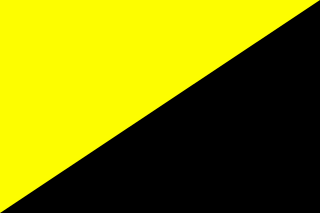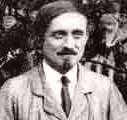Individual is a person or any specific object in a group of things.
Contents
Individual, Individualism or Individuality may also refer to:
Individual is a person or any specific object in a group of things.
Individual, Individualism or Individuality may also refer to:

Anarcho-capitalism is an anti-statist, libertarian, and anti-political philosophy and economic theory that seeks to abolish centralized states in favor of stateless societies with systems of private property enforced by private agencies, the non-aggression principle, free markets and the right-libertarian interpretation of self-ownership, which extends the concept to include control of private property as part of the self. In the absence of statute, anarcho-capitalists hold that society tends to contractually self-regulate and civilize through participation in the free market, which they describe as a voluntary society involving the voluntary exchange of services and goods. In a theoretical anarcho-capitalist society, the system of private property would still exist and be enforced by private defense agencies and/or insurance companies selected by customers, which would operate competitively in a market and fulfill the roles of courts and the police.
Egalitarianism, or equalitarianism, is a school of thought within political philosophy that builds on the concept of social equality, prioritizing it for all people. Egalitarian doctrines are generally characterized by the idea that all humans are equal in fundamental worth or moral status. Egalitarianism is the doctrine that all citizens of a state should be accorded exactly equal rights. Egalitarian doctrines have motivated many modern social movements and ideas, including the Enlightenment, feminism, civil rights, and international human rights.
Individualist anarchism is the branch of anarchism that emphasizes the individual and their will over external determinants such as groups, society, traditions and ideological systems. Although usually contrasted to social anarchism, both individualist and social anarchism have influenced each other. Some anarcho-capitalists claim anarcho-capitalism is part of the individualist anarchist tradition while others disagree and claim individualist anarchism is only part of the socialist movement and part of the libertarian socialist tradition. Mutualism, an economic theory sometimes considered a synthesis of communism and property, has been considered individualist anarchism and other times part of social anarchism. Many anarcho-communists regard themselves as radical individualists, seeing anarcho-communism as the best social system for the realization of individual freedom. Economically, while European individualist anarchists are pluralists who advocate anarchism without adjectives and synthesis anarchism, ranging from anarcho-communist to mutualist economic types, most American individualist anarchists of the 19th century advocated mutualism, a libertarian socialist form of market socialism, or a free-market socialist form of classical economics. Individualist anarchists are opposed to property that violates the entitlement theory of justice, that is, gives privilege due to unjust acquisition or exchange, and thus is exploitative, seeking to "destroy the tyranny of capital, — that is, of property" by mutual credit.

Individualism is the moral stance, political philosophy, ideology and social outlook that emphasizes the intrinsic worth of the individual. Individualists promote the realisation of one's goals and desires, valuing independence and self-reliance, and advocating that the interests of the individual should gain precedence over the state or a social group, while opposing external interference upon one's own interests by society or institutions such as the government. Individualism is often defined in contrast to totalitarianism, collectivism and more corporate social forms.
Positive liberty is the possession of the power and resources to act in the context of the structural limitations of the broader society which impacts a person's ability to act, as opposed to negative liberty, which is freedom from external restraint on one's actions.
Individualist feminism, also known as ifeminism, is a libertarian feminist movement that emphasizes individualism, personal autonomy, freedom from state-sanctioned discrimination against women, and gender equality.

Self-ownership, is the concept of property in one's own body, expressed as the moral or natural right of a person to have bodily integrity which means to be the exclusive controller of one's own body including one's life, where 'control' means exerting any physical interference and 'exclusive' means including the right to enforce a ban on other people controlling it. Self-ownership is a central idea in several political philosophies that emphasize individualism, such as libertarianism, liberalism, and anarchism. Since the definition of property title includes the implicit ban of other people claiming property title over the same resource at the same time, the right to control or interfere with one's own body in any arbitrary way is secured.
The nature of capitalism is criticized by left-wing anarchists, who reject hierarchy and advocate stateless societies based on non-hierarchical voluntary associations. Anarchism is generally defined as the libertarian philosophy which holds the state to be undesirable, unnecessary and harmful as well as opposing authoritarianism, illegitimate authority and hierarchical organization in the conduct of human relations. Capitalism is generally considered by scholars to be an economic system that includes private ownership of the means of production, creation of goods or services for profit or income, the accumulation of capital, competitive markets, voluntary exchange and wage labor which has generally been opposed by anarchists historically. Since capitalism is variously defined by sources and there is no general consensus among scholars on the definition nor on how the term should be used as a historical category, the designation is applied to a variety of historical cases, varying in time, geography, politics and culture.

Émile Armand, pseudonym of Ernest-Lucien Juin Armand, was an influential French individualist anarchist at the beginning of the 20th century and also a dedicated free love/polyamory, intentional community, and pacifist/antimilitarist writer, propagandist and activist. He wrote for and edited the anarchist publications L'Ère nouvelle (1901–1911), L'Anarchie, L'En-Dehors (1922–1939) and L'Unique (1945–1953).
Minority may refer to:
Anarchism is generally defined as the political philosophy which holds the state to be undesirable, unnecessary and harmful as well as opposing authority and hierarchical organization in the conduct of human relations. Proponents of anarchism, known as anarchists, advocate stateless societies based on non-hierarchical voluntary associations. While anarchism holds the state to be undesirable, unnecessary and harmful, opposition to the state is not its central or sole definition. Anarchism can entail opposing authority or hierarchy in the conduct of all human relations.
Individualist anarchism in the United States was strongly influenced by Benjamin Tucker, Josiah Warren, Ralph Waldo Emerson, Lysander Spooner, Pierre-Joseph Proudhon, Max Stirner, Herbert Spencer and Henry David Thoreau. Other important individualist anarchists in the United States were Stephen Pearl Andrews, William Batchelder Greene, Ezra Heywood, M. E. Lazarus, John Beverley Robinson, James L. Walker, Joseph Labadie, Steven Byington and Laurance Labadie.
The following outline is provided as an overview of and topical guide to the human self:
The following outline is provided as an overview of and topical guide to anarchism, generally defined as the political philosophy which holds the state to be undesirable, unnecessary and harmful, or alternatively as opposing authority and hierarchical organization in the conduct of human relations. Proponents of anarchism, known as anarchists, advocate stateless societies or non-hierarchical voluntary associations.

Egoist anarchism or anarcho-egoism, often shortened as simply egoism, is a school of anarchist thought that originated in the philosophy of Max Stirner, a 19th-century philosopher whose "name appears with familiar regularity in historically orientated surveys of anarchist thought as one of the earliest and best known exponents of individualist anarchism".
Individualist anarchism in Europe proceeded from the roots laid by William Godwin and soon expanded and diversified through Europe, incorporating influences from individualist anarchism in the United States. Individualist anarchism is a tradition of thought within the anarchist movement that emphasize the individual and his or her will over external determinants such as groups, society, traditions, and ideological systems. While most American individualist anarchists advocate mutualism, a libertarian socialist form of market socialism, or a free-market socialist form of classical economics, European individualist anarchists are pluralists who advocate anarchism without adjectives and synthesis anarchism, ranging from anarcho-communist to mutualist economic types.
Major anarchist thinkers, past and present, have generally supported women's equality. Free love advocates sometimes traced their roots back to Josiah Warren and to experimental communities, viewing sexual freedom as an expression of an individual's self-ownership. Free love particularly stressed women's rights. In New York's Greenwich Village, "bohemian" feminists and socialists advocated self-realisation and pleasure for both men and women. In Europe and North America, the free love movement combined ideas revived from utopian socialism with anarchism and feminism to attack the "hypocritical" sexual morality of the Victorian era.
An individual is that which exists as a distinct entity. Individuality is the state or quality of being an individual; particularly of being a person unique from other people and possessing one's own needs or goals, rights and responsibilities. The concept of an individual features in diverse fields, including biology, law, and philosophy. Every individual contributes significantly to the growth of a civilization. Society is a multifaceted concept that is shaped and influenced by a wide range of elements, including human behaviors, attitudes, and ideas. The culture, morals, and beliefs of others as well as the general direction and trajectory of the society can all be influenced and shaped by an individual's activities
Some observers believe that existentialism forms a philosophical ground for anarchism. Anarchist historian Peter Marshall claims "there is a close link between the existentialists' stress on the individual, free choice, and moral responsibility and the main tenets of anarchism".
Oneself is a reflexive pronoun. It may also refer to: